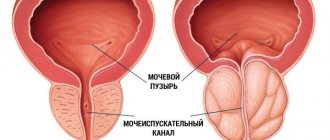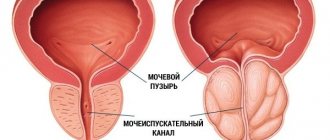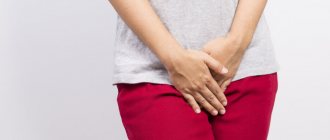Causes of chronic cystitis
Effective treatment of chronic cystitis in women is possible only with accurate identification of the cause. The chronic form is a consequence of incorrect treatment of the acute phase. Most often, pathology is provoked by infectious agents. The high risk of infection is explained by the proximity of the urinary tract to the anus. Also, the danger increases due to unprotected sex with casual partners, when the causative agent is sexually transmitted infections.
In addition, risk factors for the inflammatory process are:
- hormonal changes in the body;
- use of medications;
- allergic reactions;
- viral infection;
- hypothermia;
- decreased immunity;
- abnormalities in the structure and functioning of the urinary tract;
- lack of personal hygiene;
- failure in the endocrine system;
- chronic systemic diseases (diabetes, oncology, gastrointestinal dysfunction).
Cystitis in popular questions and answers
Zavyalova Ekaterina Sergeevna
Urologist
April 26, 2021
Almost every woman experiences cystitis during her life. Most often these are single attacks, but sometimes the symptoms of the disease are repeated again and again. The problem of cystitis, although it seems banal, has many features and pitfalls. This article contains answers to the most common questions patients have about cystitis.
Do I have cystitis?
Any disturbances in urination and pain during it are perceived by women as cystitis. Indeed, frequent and painful urination is most often caused by inflammation. But not always. There are other reasons, for example: the passage of salts and small stones in the urine may be accompanied by similar symptoms. Increased urination without pain at all can be a consequence of many conditions: emotional lability, endocrine pathology, neurogenic causes (related to the sensitivity of nerve fibers), gynecological diseases, pathologies of the urinary tract of a non-inflammatory nature.
Why is this happening?
In women, the anatomical structure predisposes to inflammatory diseases of the urinary system. This is the proximity of the urethra to the natural reservoirs of infection - the rectum and vagina. And also the features of its structure: it is wide and short compared to men's. It is much easier for pathogenic bacteria to reach the bladder. The immediate causes of cystitis can be inflammatory diseases of the genital tract, hemorrhoids, stool disorders, and hygienic errors.
In young women, cystitis is often associated with the onset of sexual activity. If the urethra and vagina are located very close to each other, even without infection, trauma, inflammation and symptoms of cystitis can occur. In this case, after examination by a gynecologist, uroseptic drugs are prescribed prophylactically before and after sexual intercourse. In older women, cystitis can occur against the background of developing atrophic processes caused by hormonal changes.
What to do if symptoms of cystitis appear?
Do not try to take antibacterial drugs , but consult a doctor who will select the correct treatment and monitor its effectiveness. There are many medications to combat cystitis, with different effects with their own indications and contraindications. The choice of drug depends on many factors: frequency of attacks, what drugs have already been used, concomitant diseases, age, and so on. As a first measure, before visiting a doctor, you can take a urological preparation, exclude spicy foods and alcohol, and take No-shpa to reduce pain.
warming after a visit to the doctor, in combination with antibiotics, and only if there is no fever and there is no blood in the urine. At the first appointment with a urologist, in case of an acute condition, antibiotics are immediately prescribed to relieve inflammation and pain; in addition, herbal uroseptics . After the course of treatment, you need to do a general urine test and urine culture to determine whether there is any remaining infection, and an ultrasound of the bladder to rule out structural changes (thickening of the walls).
What is the cause of chronic cystitis?
If acute cystitis is not adequately treated, the infection will remain in the bladder and will periodically cause exacerbations. Also, the reason for the transition of the inflammatory process to chronic forms may be other diseases of the urinary system, anatomical abnormalities of the urinary tract, diseases of neighboring organs, in particular gynecological ones. In addition, changes in the mucous membrane of the bladder itself can support the inflammatory process. Cystitis is considered chronic if attacks plague a woman for more than two years, and more than three exacerbations occur per year. Or there are a large number of attacks throughout the year.
Is it possible to cure chronic cystitis?
It is possible, but you need to be patient. Usually, an in-depth examination is required: bacteriological analysis of urine, with determination of sensitivity to antibiotics, ultrasound of the kidneys and bladder, in some cases - cystoscopy (examination of the bladder mucosa from the inside using an instrument). You can read more about cystoscopy on the blog of the urology department.
Cystoscopy is not performed during periods of exacerbation of cystitis. This study is carried out if the tests are good, ultrasound does not reveal any abnormalities, and the symptoms recur. In this case, it is necessary to look at the condition of the mucous membrane from the inside in order to exclude processes that are not visible on ultrasound, for example, leukoplakia (this is a change from one type of mucous membrane to another, not typical for the bladder, causing frequent urination).
Once the diagnosis of leukoplakia is confirmed, surgical treatment is required to remove these lesions. Basically, such operations are performed using a laser.
When treating chronic cystitis, a course of intensive antibiotic therapy and the introduction of anti-inflammatory drugs into the bladder are usually carried out. are effective : medicinal electrophoresis, laser therapy. Treatment of diseases of other pelvic organs should be carried out by specialists of related specialties. It is recommended to consult a gynecologist for the diagnosis and treatment of genital infections and a gastroenterologist, since dysbiosis (increased content of opportunistic flora) can also provoke chronic cystitis.
What can be done to prevent attacks of cystitis?
In case of chronic cystitis, you should not drink alcohol, spicy, salty foods. Coffee, beloved by many, has an irritating effect on the bladder mucosa, so if you have cystitis, it should be avoided. It is important to drink at least two liters of water per day. Hypothermia and overheating can trigger an attack of cystitis, and although inflammation directly occurs due to the proliferation of bacteria, overheating of the pelvic area creates favorable conditions for this, and hypothermia reduces the body's defenses and reduces resistance to infections.
Pathogenesis
Treatment of chronic cystitis is aimed at improving the general condition and relieving symptoms. The pathology manifests itself as pain and frequent urge to urinate. If the inflammatory focus is not stopped, the signs of the disease increase. Patients note:
- burning and discomfort in the perineum;
- pain when urinating;
- feeling of incomplete emptying of the bladder;
- change in the color and odor of urine;
- the appearance of blood in the urine;
- pain in the lower abdomen radiating to the lower back.
Pathology can develop and lead to general malaise, fever, loss of strength, and headache.
Where to go
Urological Center of Branch No. 1 of the Federal State Institution “GVKG named after. Academician N. N. Burdenko" treats various diseases of the genitourinary system, including cystitis of all forms, including chronic. The main advantages of our hospital are:
- solid experience in the treatment of urological pathologies accumulated by our department since 1974;
- highly qualified employees – holders of medical degrees, doctors of the highest category;
- technical base that fully meets modern criteria.
Diagnosis of chronic cystitis
The doctor determines how to treat chronic cystitis in a woman, based on data from laboratory and instrumental studies. To make a decision, the specialist collects anamnesis, assesses the time of development of symptoms, and takes into account concomitant chronic diseases. The diagnosis is made based on the following studies:
- general blood analysis;
- general urine analysis;
- vaginal smear for microflora;
- Blood PCR for sexually transmitted infections;
- bacterial culture of urine;
- endoscopic examination of the bladder;
- Ultrasound of the genitourinary system.
At-risk groups
Bladder diseases are more common as you age. Women are more susceptible to this because they have a shortened urethra, which makes it easier for bacteria to enter the bladder.
Other factors that cause bladder problems may include:
- sedentary lifestyle;
- insufficient fluid intake;
- working with harmful factors (acrylic dyes);
- smoking;
- narrowing of the urethra;
- prostate hyperplasia;
- difficult childbirth;
- diabetes.
Therapy
The treatment regimen for chronic cystitis will vary depending on the pathogen. In addition to taking medications, it is important to maintain a healthy lifestyle and diet. For a speedy recovery, rest and light food are desirable. The drinking regime is plentiful; the use of diuretics is recommended to remove pathogenic microorganisms.
Prescriptions may consist of the following medications:
- antibacterial (when pathogens are detected on crops);
- antispasmodic (eliminate muscle spasms, relieve pain, promote urine evacuation);
- anti-inflammatory (improves the condition of the mucous membrane, promotes epithelial regeneration).
Herbal medicine is effective as part of complex treatment. It is important to understand that the course prescribed by the doctor must be completed in full. Taking medications should not be stopped after the first improvement, because the disappearance of symptoms does not indicate complete recovery.
After a course of antibiotics, if necessary, the doctor may prescribe restorative therapy, which will be aimed at normalizing the microflora of the vagina and gastrointestinal tract.
Etiology
The causative agent of acute uncomplicated cystitis in most cases (about 80–90%) is Escherichia coli
and much less often - other pathogens of urinary infection:
Staphylococcus saprophyticus, Klebsiella spp., Proteus spp.
and others [4].
Currently, multicenter clinical studies are regularly conducted around the world to monitor UTI pathogens and their antibiotic resistance. The largest international study, ECO-SENS, involving 4,734 patients from 252 clinics in 16 countries in Europe and Canada, which ended in 2003, revealed the following patterns: in 77.7% of patients, UTIs were caused by E. coli
, in 5.2% -
Proteus mirabilis
, in 2.8% -
Klebsiella spp
., in 3.9% - other representatives of the
Enterobacteriaceae
, in 4.6% -
S. saprophyticus
and in 5.8% - other microorganisms.
29.8% of the isolated strains of microorganisms were insensitive to ampicillin, 29.1% to sulfamethoxazole, and 14.8% to trimethoprim. E. coli
strains to ciprofloxacin, the combination of amoxicillin and clavulanic acid, nitrofurantoin, gentamicin and fosfomycin trometamol was observed in less than 3% of patients [5].
In Russia, under the leadership of Professor L.S. Strachunsky, similar studies were conducted: UTIAP I (1998–1999), UTIAP II (2000–2001) and UTIAP III (2004–2005). During these studies, it was found that in Russia, acute cystitis was caused by E. coli
, in 6% -
Klebsiella spp
., in 1.8% -
Proteus spp.,
in 1.6% -
S. saprophyticus
, in 1.2% -
Pseudomonas aeruginosa
etc.
E. coli
resistant to ampicillin were found in 22.7-44% of cases, to co-trimoxazole - in 16.2-26.9%, to nitroxoline - in 6.8-7.9% of cases.
Resistance of E. coli
to norfloxacin, ciprofloxacin and nitrofurantoin was noted in less than 3% of patients with acute cystitis [6, 7].
The multicenter study "DARMIS-2011" showed that among the causative agents of UTIs, the proportion of representatives of the family Enterobacteriaceae
amounted to 83.5%.
At the same time, E. coli
was detected in 63.5% of patients.
In general, the frequency of pathogen isolation did not differ significantly between patients with complicated and uncomplicated UTIs [8]. In the DARMIS-2018 study, the detection rate of E. coli
in the group of patients with uncomplicated infection was 74.6%, complicated - 67.2%,
Klebsiella pneumoniae
- 9.6% and 12.7%;
P. mirabilis -
3% and 4.6%;
Enterococcus faecalis -
5% and 6.3%;
Staphylococcus spp.
— 2.3% and 1.2%, respectively;
the proportion of P. aeruginosa
that was detected in complicated UTIs was 1.7%.
E. coli
strains to ampicillin (57.7%), amoxicillin/clavulanate (43%) and trimethoprim/sulfamethoxazole (36.9%) was recorded; a decrease in sensitivity to ciprofloxacin (60.6%) was also noted, which was significantly lower than 7 years ago (79.9%). Compared with the previous study, according to DARMIS-18, the number of pathogenic microorganisms producing extended spectrum β-lactamases increased statistically significantly - from 8.5% to 27% [8].
Preventive actions
Treatment of exacerbations of chronic cystitis involves the development of recommendations for preventing relapses. A comprehensive diagnosis helps with this. After establishing the cause of the pathology, the doctor may prescribe immunostimulants and drugs to support hormonal levels. Adjusting the drinking regime and diet help. Physiotherapeutic procedures and gymnastics have proven themselves to be effective preventive measures.
Treatment and recovery services for chronic cystitis are offered by the Dr.AkNer clinic. We employ urologists and gynecologists with extensive experience in successfully treating even the most complex cases. Specialists accept appointments by appointment, so you don’t have to spend time in queues.
Do I need to take antibiotics to treat cystitis?
If the condition does not improve even two to three days after the exacerbation, you should consult a therapist. Only the doctor decides on the advisability of taking antibiotics. Not all types of cystitis require antibiotic therapy. Self-administration of antibiotics “selected” by a pharmacist is dangerous for the development of resistance. This means that for other more acute and dangerous conditions, antibiotic therapy will not work. The therapist usually requests the results of a urine test, and then selects a specific drug. It is important to complete the full course of antibiotic therapy, even if the symptoms of cystitis seem to have disappeared. Otherwise, the risk of developing a chronic form of the disease increases.
Diet
The diet for cystitis is designed to facilitate the functioning of the body and normalize the composition of urine. Ideally, it is necessary to adhere to a dairy-vegetable diet with an abundance of fruits, vegetables, and dairy products. It is recommended to limit fatty and fried foods, spicy and salty foods, as well as the use of spices as much as possible. Alcohol in any form or dose is strictly prohibited until treatment is completed. But clean water should be consumed without restrictions and in larger quantities than usual.
Remember, cystitis is not just pain or pain when urinating. An insidious disease can become chronic and become truly dangerous. Experienced specialists of the Energy of Health clinic will conduct the necessary examinations, make a diagnosis and prescribe effective treatment, getting rid of inflammation in the shortest possible time. Do not delay your visit to the doctor, sign up for “Health Energy” at the first symptoms.
Forms of the disease
Features of the course of the disease make it possible to distinguish between acute and chronic cystitis. In the first case, the pathology occurs abruptly and is characterized by pronounced, vivid symptoms. The chronic form often occurs in waves, characteristic signs appear and disappear, and the process itself is extended over time. This usually occurs against the background of existing diseases of the genitourinary system.
The acute form of cystitis forces you to consult a doctor immediately. Severe pain is often accompanied by urinary incontinence. In a chronic course, the patient may not rush, but the situation in this case is much more dangerous. With long-term inflammation, the cells of the mucous membrane of the bladder can transform, which ultimately risks leading to the development of a cancerous tumor.
With timely consultation with a doctor, both problems can be successfully resolved. By following the recommendations of a specialist, the symptoms of acute cystitis can be eliminated in 5-7 days, and chronic inflammation will require at least 10 days. With an undulating course of the disease, the intervals between attacks are usually about a month.
Make an appointment
Prevention
In order to forget about this unpleasant illness forever, it is necessary to approach the issue comprehensively. It is important to organize your life and work so as not to provoke another relapse. To do this you need:
- From birth, be attentive to intimate hygiene procedures in girls, instill in them the habit of properly and daily caring for the urogenital area.
- Correct, including surgically, congenital anomalies in the location of the external opening of the urethra.
- If you have an STI, treat it immediately in both partners.
- Maintain sexual hygiene.
- Stop all sources of inflammation in the body (chronic tonsillitis, caries, etc.).
- Avoid hypothermia, avoid colds if possible.
- Support your immune system with physical activity, a balanced diet, and a lack of stress.
- Periodically undergo rehabilitation and prevention of chronic cystitis in sanatoriums of the appropriate profile.
We wish you good health!
- Russian clinical guidelines Urology Edited by Yu.G. Alyaeva, P.V. Glybochko, D.Yu. Pushkar, Moscow 2021 (date of access: 04/08/2021).
- Laurent O.B., Zaitsev A.V., Lipsky V.S. Diagnosis and treatment of interstitial cystitis in women. Saratov, 2001 (date of access: 04/08/2021).
- Martov A.G. , Muzhetskaya N.G. , Salyukova Yu.R., . Salyukov R.V. Minimally invasive methods for the treatment of interstitial cystitis/vesical pain syndrome, 2021 (date of access: 04/08/2021).
- Zaitsev A.V., Kasyan G.R., Spivak L.G. Cystitis, 2021 (accessed 04/08/2021).
- ICD 10 - International Classification of Diseases, 10th Revision (access date: 04/08/2021).
- Guide to urology / ed. ON THE. Lopatkina. 1998
- JS Reid The other cystitis: interstitial cystitis 1985 (date of access: 04/08/2021).
- Khalilova U.A. Skvortsov V.V. Ismailov I.Ya. Lugovkina A.A. Proleyskaya N.A. Cystitis, 2021 (date of access: 04/08/2021).
- Malkoch A.V., Filatova N.N. Urinary tract infection and the role of herbal remedies in its complex therapy. Attending doctor. 2015;3:1–4. (date of access: 04/08/2021).
- Instructions for medical use of the drug Fitolysin® Paste for the preparation of a suspension for oral administration
- As part of complex therapy
Cystitis in cancer
If a malignant or benign tumor begins to form in the mucous membrane of the bladder, it impairs the organ’s ability to stretch and provokes the urge to urinate even with a small amount of urine. The condition is rarely accompanied by severe pain and often has scant symptoms. That is why all long-term cystitis requires special attention and a thorough examination of the patient for the presence of an oncological process.
There is also radiation cystitis that occurs when undergoing appropriate therapy. Ionizing radiation causes atrophy of the bladder mucosa and the formation of scars in its wall. This leads to a gradual deterioration in the functioning of the organ.
Make an appointment









